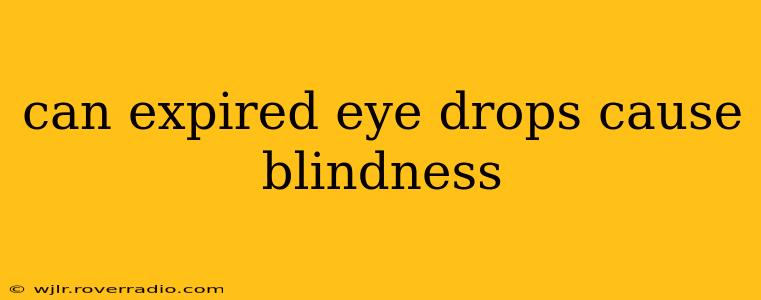Using expired eye drops is risky and can potentially lead to serious eye problems, including—in rare cases—blindness. While it's unlikely a single use of expired drops will cause immediate blindness, the longer they're past their expiration date, the greater the risk of contamination and harmful effects. This article will explore this risk in detail, answering common questions about expired eye medications.
What Happens When Eye Drops Expire?
Eye drops, like all medications, have a shelf life. After the expiration date, the active ingredients can degrade, becoming less effective or even potentially harmful. More importantly, the sterility of the solution is compromised. The preservatives meant to prevent bacterial growth become less effective over time, allowing harmful bacteria and fungi to flourish. This contamination can lead to a range of eye infections.
Can Expired Eye Drops Cause Infection?
Yes, absolutely. Contaminated expired eye drops can easily introduce bacteria or fungi directly into the eye, leading to infections like conjunctivitis (pink eye), keratitis (inflammation of the cornea), or even more severe infections that can damage the eye's structure. These infections can be extremely painful and, if left untreated, could cause permanent vision impairment or blindness.
What are the Symptoms of an Eye Infection from Expired Eye Drops?
Symptoms of an eye infection can vary but often include:
- Redness and swelling: The whites of your eyes may appear red and inflamed.
- Itching and burning: You might experience intense itching and burning sensations in your eyes.
- Excessive tearing: Your eyes may water more than usual.
- Pus or discharge: A yellowish or greenish discharge may form in the corner of your eye.
- Blurred vision: Your vision could become blurry or hazy.
- Pain and sensitivity to light: Exposure to light may become painful.
If you experience any of these symptoms after using expired eye drops, seek immediate medical attention from an ophthalmologist or optometrist.
What Should I Do if I Accidentally Used Expired Eye Drops?
If you've used expired eye drops, monitor your eyes closely for any signs of infection. Even if you don't experience immediate symptoms, it's crucial to remain vigilant for several days. If you notice any redness, swelling, pain, or discharge, consult an eye doctor immediately. Don't attempt to self-treat; prompt medical care is essential.
How Long Are Eye Drops Good For After Opening?
Once opened, eye drops typically have a shorter shelf life than their expiration date suggests. Always check the specific instructions on the bottle, as this varies depending on the product and preservatives used. Generally, opened eye drops should be discarded after several weeks, even if they haven't reached their printed expiration date.
How Can I Prevent Eye Infections from Expired Eye Drops?
The best way to avoid eye infections from expired eye drops is to simply discard them after the expiration date or the recommended timeframe after opening. Always check the expiration date before using any eye medication and never reuse eye drops once the bottle has been opened. Proper hygiene practices, such as washing your hands before administering eye drops, are also important.
Conclusion:
While using expired eye drops might not always immediately cause blindness, it significantly increases the risk of serious eye infections that can lead to vision impairment or, in severe cases, blindness. Always prioritize eye health by properly disposing of expired eye drops and seeking professional medical attention if you suspect an infection. Remember, your vision is invaluable. Don't take unnecessary risks.
